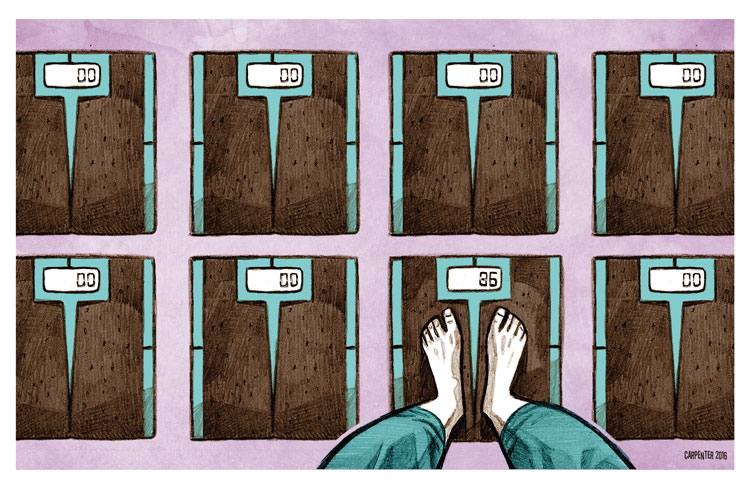
One of the first questions Dr. Terrill Bravender asks of new patients in the Comprehensive Eating Disorders program is how often they weigh themselves.
At least eight times a day is not unusual for many of them, says Bravender, head of adolescent medicine at C.S. Mott Children’s Hospital in Ann Arbor. The CED program is housed within his division.
Frequent self-weighing is often seen in young people with eating disorders. But it can also signal that a teen is struggling with depression and poor body image.
That’s the findings of a recent study that looked at self-weighing among nearly 1,900 middle- and high-school teens as they moved from adolescence to young adulthood. The boys who weighed themselves a lot were less likely to be emotionally tied to the scale than the girls. But they, too, resorted to fasting, smoking, taking laxatives, and vomiting to keep down their weight.
One of the conclusions of the 10-year Project EAT (Eating and Activity in Teens and Young Adults) study is that frequent self-weighing is a red flag for other problems — like depression — and that it should trigger an intervention before it blows up into a true disorder. The study, “Self-Weighing Throughout Adolescence and Young Adulthood: Implications for Well Being,” was published late last year in the Journal of Nutrition Education and Behavior.
Lead author and registered dietitian Carly Pacanowski, Ph.D., says the goal of the research was to see if self-weighing is a good weight management tool for younger people or if it can backfire.
With obesity at epidemic proportions in the U.S., it’s also important to check the kinds of messages we’re sending, she says, such as anti-obesity campaigns that do harm when weight and body mass index is emphasized over healthiness.
A few key findings of the study:
• Frequent self-weighing was linked with lower body satisfaction, higher depression, and lower self-esteem in females.
• Among high schoolers, nearly 21 percent of the females and 6 percent of the males who weighed themselves a lot said they’d used extreme weight control measures like vomiting and using diuretics (salt pills) and laxatives to control their weight.
• The more frequently teens weighed themselves, the greater the gulf between their actual and desired weight.
An intriguing finding is that over the 10 years of weighing themselves, sometimes obsessively, the needle on the scale didn’t move much.
Not surprising, Bravender says. Some of the young (mostly) women who enter the Comprehensive Eating Disorders program (which treats young people ages 8 to 24) are hyper-focused on small fluctuations in their weight throughout the day — not necessarily in losing weight.
“If their weight is down, that gives them positive feedback and they’ll have a good day,” Bravender says. “One of the first interventions we do is ask parents to get rid of all the scales in the house — throw them away, or duct-tape the scale in a box and put it in the attic. Without a scale, there’s no temptation. It becomes a more onerous process to check their weight.”
If parents notice it, they should say they are worried about it and ask their teens why they feel the need to weigh themselves all the time. And adults should try not to react to “weight talk,” nor talk about their own weight. Children internalize those messages, Bravender says.
Bloomfield Hills psychologist Amy Baker Dennis, Ph.D., specializes in treating eating disorders. She says genetics plays a role — in some families, they can be multigenerational — but the environment “pulls the trigger.” Like Bravender, she says parents need to model healthy eating habits and quit talking about their own weight if they want their children to develop a healthy body image.
“If someone is constantly ragging on herself about weight, it can trigger a genetic vulnerability,” Dennis says.
Pushing children to do better — even if they’re already high-performing — can also lead to self-controlling behaviors like frequent self-weighing.
“Frequent weighing means they’re trying to control something because other things in their life, they feel, aren’t being managed well,” Dennis says.
Using the scale as a barometer of self-worth is dangerous regardless, but a universal emphasis on weight also sends the wrong message.
“We really need to be very careful in our fight against obesity and our campaign against obese children to not send the wrong message that there’s something inherently wrong. Obesity is a medical issue,” Dennis says.
Bravender says frequent self-weighing doesn’t help with weight management, for example yo-yo dieters who use the scale a lot.
“There are a lot of research studies that show that the more diets people go on, the higher their weight goes. Restrictive eating causes weight loss and subsequent weight gain. Self-weighing probably plays into the idea that ‘I better check my weight, I have to go on a diet,’ but in the long run it won’t help with weight management,” he says.
Bravender offers a familiar mantra that is not often heeded: Eat in a mindful way, get regular exercise, and eat breakfast every day.
Pacanowski suggests: Talk to your teen about what the body can do rather than what it looks like, and encourage him or her to take up yoga or another practice that focuses on the body’s amazing strength and resilience when it’s in good shape.
The research into dieting and its role in depression seems to suggest we should stop talking about weight and BMI altogether. Perhaps we should do away with scales, too?
“That’s what I’d like to research next,” Pacanowski says.
|
|
|









